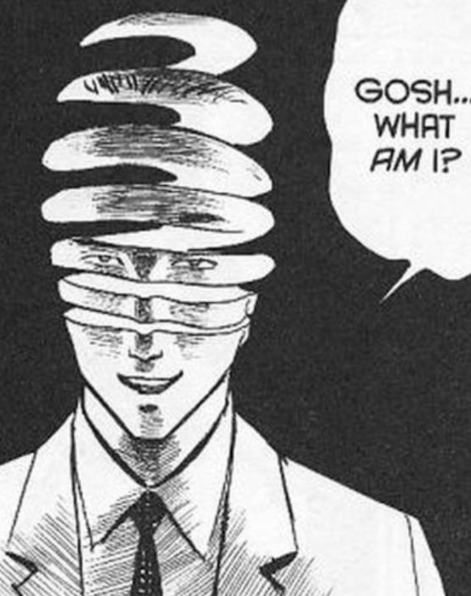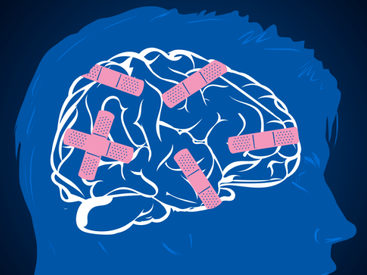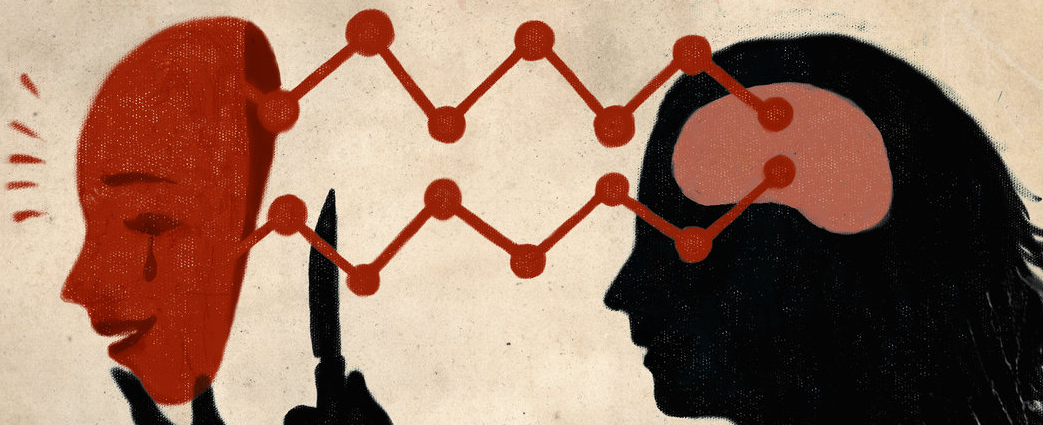Psychology 16 - Do Psychopaths Know They're Psychopaths?
1. Read the following essay by a real psychopath.
2. Answer the questions that follow the essay, using evidence from the essay itself.
|
People ask me: "How do you know you are a psychopath?" I was officially given the psychopathy diagnosis when I went to prison for murder the first time at the age of 18. But I didn't take the diagnosis serious, I didn't believe in it, because like most people at the time I didn't know what it means to be a psychopath. Today, most of the psychopaths who can read and who have access to general information via the media know what they are. But it wasn't always like this. I have wondered by myself many, many times: What am I? I knew I was different from other people, but I thought I was different in a good way, and in my heart I still think so. I've always thought of myself as a good person, and all I knew about psychopaths was what 'everybody' think they know about psychopaths.
Few people think of themselves as common brutes and petty thieves, and that is no different for psychopaths. Furthermore, most psychopaths probably really do not fit this stereotype. I certainly never did. Another common misconception is: 'Psychopaths are Evil'. Sure, psychopaths do things that many will think of as evil, but in the sentiment 'psychopaths are evil' lies a subtle implication that they're decisively evil, that evil is what they have chosen to be. |
So what is it that we all think we know about psychopaths? What do we think psychopathy is? We think psychopaths are bad, they're mad, crazy, they're psychotic and maybe even schizophrenic, they're evil simpletons and brutes who can't behave or talk civilized, and they spend their lives surfing porn on the Internet, or - when in prison - covering their bodies with crude home made tatoos, and of course they drink excessively, they commit murder for 50 bucks, and are petty criminals or serial killers. Those are things we all think we know about psychopaths. What I don't know is that whereas there are indeed psychopaths like that, the majority are very different. Most psychopaths are not the psychotic gangster stereotypes most people are accustomed to believe that we are. But the common idea about what a psychopath is do also influence what psychopaths themselves believe a psychopath to be, and this is one of the main reasons that many psychopaths aren't aware that they are psychopaths - or at least they weren't until recently. |
Psychopaths rarely think of themselves as evil. And if they do, what being evil is to us often doesn't mean the same as it does to most people. This is part of the paradox that surrounds psychopathic individuals, we don't have the same emotional attachment to ideas and concepts that do neurotypical (normal) people and because of this we often form models of reasoning that are different from the norm. It doesn't mean we're insane, but it means our values are detached from average systems of mores.
|
Virtually all psychopaths know early on in life that they're different from other people. We know we're different, but we don't know exactly how or what it means.
One of the first things we notice about ourselves is that we tend to not react emotionally the same way that others do. We tend to be less afraid than others. Other kids, and even adults, become afraid of things that to us are intriguing or fascinating, and we very quickly realize that remaining calm when others are afraid very often is an advantage. We also very soon get the impression that all the feelings, such as love and empathy, guilt and remorse, seem to be mere constructs that the adults try to force us to feel, but which to us really do not exist. We see adults and kids display these emotions on a daily basis, and we're expected to display them also, abut all we can do is pretend and pretending we find is easy to do, everybody believes us while as we're simply merely faking it. |
Nobody seems to acknowledge that empathy isn't real, so we assume everybody are doing what we are doing: Faking their emotions.
Of course most psychopaths do realize at some point that all the emotions that aren't real to us are indeed very real to others, but this doesn't change the fact that we cannot feel them. It also doesn't change the fact that we are expected to feel them, or that if we don't we'll see ourselves punished in one way or another, so we quickly learn that faking is better than being honest. Perhaps this is where all the psychopath's manipulation takes it's beginning? I don't know, but it's at least worth considering.
We've always been told that adults know everything, but we find that they don't know the difference between faking and actually feeling something, so we grow suspicious. Maybe the adults don't know everything after all?
The world reveals itself as an arena where the strong, those who have control over their emotions and who don't feel the emotions that seems to only weaken others, are kings and queens. Psychopaths become adept at reading others very early on in life - if we have the opportunity to observe others, that is. If we're packed away in an institution throughout childhood and early adolescence we're more likely to grow up relying on physical violence. Like other people, not all psychopaths have the same opportunities in life, and for some there's only a life as small time criminal's way out of crushing boredom.
Of course most psychopaths do realize at some point that all the emotions that aren't real to us are indeed very real to others, but this doesn't change the fact that we cannot feel them. It also doesn't change the fact that we are expected to feel them, or that if we don't we'll see ourselves punished in one way or another, so we quickly learn that faking is better than being honest. Perhaps this is where all the psychopath's manipulation takes it's beginning? I don't know, but it's at least worth considering.
We've always been told that adults know everything, but we find that they don't know the difference between faking and actually feeling something, so we grow suspicious. Maybe the adults don't know everything after all?
The world reveals itself as an arena where the strong, those who have control over their emotions and who don't feel the emotions that seems to only weaken others, are kings and queens. Psychopaths become adept at reading others very early on in life - if we have the opportunity to observe others, that is. If we're packed away in an institution throughout childhood and early adolescence we're more likely to grow up relying on physical violence. Like other people, not all psychopaths have the same opportunities in life, and for some there's only a life as small time criminal's way out of crushing boredom.
Whether or not a psychopath realize that he or she is a psychopath also depends upon social and cultural background. Where I come from I may have heard the word psychopath before I turned 18, but after I received my diagnosis the first time I only checked up on what it meant twice, and I was never told what it meant. I learned a bit by reading two outdated books on clinical psychiatry. One was written by the principal of the most notorious prison in the state where all the criminally insane, and therefore also the diagnosed psychopaths, are kept. The other was a scholarly book about psychiatric diagnoses in general. But neither book described psychopathy in a way that allowed me to recognize myself in any of it.
It wasn't until about a year ago that I took up the research again, this time with a more serious intention of finding out what it really means to be a psychopath. I wanted to understand why I've been given a psychopathy diagnosis, and luckily there have been written more realistic - if still somewhat dark - descriptions of psychopathy within the last two or so decades, in online accessible articles as well as in books. Furthermore there have been a small handful of psychopaths who share their thoughts and experiences.
It wasn't until about a year ago that I took up the research again, this time with a more serious intention of finding out what it really means to be a psychopath. I wanted to understand why I've been given a psychopathy diagnosis, and luckily there have been written more realistic - if still somewhat dark - descriptions of psychopathy within the last two or so decades, in online accessible articles as well as in books. Furthermore there have been a small handful of psychopaths who share their thoughts and experiences.
|
So to the question: Do psychopaths know they're psychopaths?, I guess the answer is yes, but it is also no. Some psychopaths know they're psychopaths while others do not.
Though there may be psychopaths who don't know they're different from the norm, I'll dare the claim that the vast majority certainly do know, and we have a good idea about how we're different though it's also a learning process. If we haven't read or been told about the meaning of the term Psychopath, we have no way of knowing that this is what we are except by chance and comparison. Other than that it is safe to say that over the last decade or so there has been a growing attention on psychopathy. Where psychopaths used to be mentioned by the use words that mainly describe our behavior, the word psychopath has now become more commonly used in connection with behaviors and traits that we recognize as descriptive characteristics in our personality. |
And that is why psychopaths in recent years have become more commonly aware that they are psychopaths, just as normal people are beginning to become more aware about what a psychopath is. The information is communicated via the media, we hear friends or family discuss the subject, or we find out about it via other sources such as books or movies.
We (psychopaths) are presently becoming much more aware of ourselves than ever before, and we're aware about the fact that 'what we are' has a special position in the public mind, in modern society... A position that may have been altered with the changes through time within history and modern culture.
Research is being done and new things learnt as we speak, this is an intriguing time where so much is awaits for us to explore new possibilities, invent new terminologies and apply better and more useful descriptions for it all.
We (psychopaths) are presently becoming much more aware of ourselves than ever before, and we're aware about the fact that 'what we are' has a special position in the public mind, in modern society... A position that may have been altered with the changes through time within history and modern culture.
Research is being done and new things learnt as we speak, this is an intriguing time where so much is awaits for us to explore new possibilities, invent new terminologies and apply better and more useful descriptions for it all.








